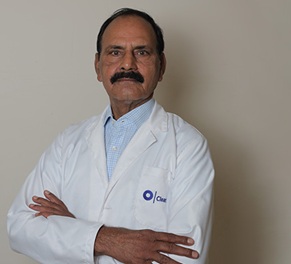Fissure Laser Surgery - Procedure, Treatment, Recovery Time
Dr. Aman Priya Khanna

Treatment Duration
15 Minutes
------ To ------30 Minutes
Treatment Cost
₹ 30,000
------ To ------₹ 1,40,000

Table of Contents
- What is Laser Fissure Surgery?
- Who Needs Laser Fissure Surgery?
- How is Laser Fissure Surgery Performed?
- What to Expect Before and on the Day of Laser Fissure Surgery?
- What to Expect After Laser Fissure Surgery?
- Benefits of Laser Fissure Surgery
- Risks and Complications of Laser Fissure Surgery
- Risks of Delayed Laser Fissure Surgery
- Cost of Laser Fissure Surgery
- Takeaway
An anal fissure is a common and painful problem affecting people of all ages. For relief, laser fissure surgery can be a safe treatment option. It is a quick and effective outpatient procedure.
Laser fissure surgery is also known as laser fissurectomy or laser sphincterotomy. After surgery, patients experience minimal discomfort and a low risk of complications. Read on to learn in detail about laser fissure surgery.
Procedure Name | Laser Fissure Surgery |
Alternative Name | Laser Fissurectomy, Laser Sphincterotomy |
Conditions Treated | Anal Fissures |
Benefits of the Surgery | Minimally invasive, No stitches |
Treated by | General Surgeon (Proctologist) |
You can check Laser Surgery for Fissure Cost here.
What is Laser Fissure Surgery?
Laser Fissure Surgery is an advanced surgical procedure to treat anal fissures. In this procedure, a laser beam destroys the scarred tissue area. Being a quick procedure, it is generally performed in an outpatient setting, meaning the patient can leave on the same day of the surgery.
Anal fissures are linear tears or open sores in the anus opening caused due to trauma or an injury. An anal fissure also causes pain, itching, and bleeding.
Anatomy and Physiology of Anal Region
The anal region, also known as the anorectal region, is a complex body area that includes structures involved in defecation (passing stool) and maintaining continence (control over bowel movements).
Here's an overview of the anatomy of the anal region:
Anus: The anus is the external opening of the digestive tract through which stool (faeces) is eliminated from the body.
It is surrounded by muscles that help release stool and maintain continence.
Anal Canal: The anal canal is a short passage that extends from the anus to the rectum.
It is lined with a mucous membrane and is where anal fissures and haemorrhoids can develop. Two muscular sphincters surround the anal canal:Internal Anal Sphincter: This involuntary smooth muscle sphincter is inside the anus and remains contracted to maintain continence. It relaxes during defecation.
External Anal Sphincter: Voluntary skeletal muscles that surround the internal sphincter and can be consciously controlled to maintain continence.Rectum: The rectum is the last part of the large intestine (colon) and serves as a temporary storage area for stool before they are expelled from the body.
The rectum stretches as stool accumulates, triggering the sensation of needing to defecate.
Anal Sinuses: The anal canal contains small pockets called anal sinuses and crypts, which can become irritated or infected, leading to conditions like anal fistulas or abscesses.
Hemorrhoidal Tissue: Haemorrhoids are clusters of blood vessels, connective tissue, and muscle located near the anus and inside the rectum.
They play a role in maintaining continence and can become swollen or inflamed, causing discomfort.Perianal Skin: The skin around the anus is called the perianal skin. It is sensitive and prone to itching, rashes, and infections.

Laser Surgery for Fissure Videos by HexaHealth
Expert Doctors (10)
NABH Accredited Hospitals (10)
Laser Surgery for Fissure Success Stories


Who Needs Laser Fissure Surgery?
Laser fissure surgery, also known as laser fissurectomy, is a potential treatment option for individuals with chronic anal fissures that have not responded to conservative treatments.
Generally, chronic anal fissures are treated with the help of laser fissure surgery. In addition to anal fissures, the following conditions are also treated with laser surgery.
Piles or Haemorrhoids
Laser fissure surgery might be recommended for individuals who:
Have Chronic Fissures: If an individual has experienced anal fissures for an extended period and the condition hasn't improved with lifestyle changes, dietary adjustments, and other conservative treatments, the doctor might consider surgical options.
Experience Severe Pain: Fissures can be extremely painful, particularly during bowel movements.
If the pain is severe and affects the quality of life, laser fissure surgery might be an option.
Bleeding Persists: If your fissures are causing persistent bleeding, your doctor might suggest surgical treatment to promote healing and reduce bleeding.
Desire Quicker Healing: Laser fissure surgery is generally considered a minimally invasive option that can promote quicker healing compared to traditional surgical methods.
Wish to Avoid Traditional Surgery: Some individuals might prefer minimally invasive techniques like laser surgery over traditional surgical procedures.
This is because they may offer advantages such as less pain, shorter recovery time, and reduced risk of complications.
Find Conservative Treatments Ineffective: Before surgery is considered, doctors typically recommend conservative treatments such as warm baths, stool softeners, increased fibre intake, and topical medications.
If these approaches don't provide relief, surgery could be an alternative.
Note: It's important to note that each patient’s condition is different, and the decision to undergo laser fissure surgery should be made in consultation with a qualified healthcare provider.
The doctor will evaluate specific conditions, medical history, and overall health to determine whether laser fissure surgery is appropriate for an individual.
How is Laser Fissure Surgery Performed?
Laser fissure surgery is a minimally invasive procedure which usually takes about 15 to 30 minutes to complete depending on the patient’s age, other medical conditions of the patient and the severity of the condition.
This procedure is performed using a CO2 laser or 1470 nm diode laser to treat anal fissures under the influence of local or general anaesthesia. The laser beams destroy the scarred tissue area.
The following steps are carried out during the procedure:
Anaesthesia: Before the procedure begins, the patient will be given anaesthesia to ensure that they are comfortable and pain-free during the surgery.
Depending on the case, local anaesthesia, regional anaesthesia (such as a spinal block), or general anaesthesia may be administered.
Preparation: Once the patient is anaesthetised, the surgical area will be cleaned and prepped for the procedure.
Laser Application: A specialised surgical laser is used to precisely target the tissue around the fissure and sealing of blood vessels to minimise bleeding.
The laser can be used to remove any scar tissue or damaged tissue that is contributing to the fissure.
Wound Care: After the laser treatment, the surgeon may apply a bandage with medication to the surgical site to aid in healing and prevent infection.
Closure and Recovery: Unlike traditional surgical methods that involve cutting and suturing, laser fissure surgery typically does not require sutures.
The area will be left to heal naturally, and the wound will close on its own over time. The patient will be monitored in a recovery room until the effects of the anaesthesia wear off and stability is regained to go home.

What to Expect Before and on the Day of Laser Fissure Surgery?
Before and on the day of laser fissure surgery, there are several important steps and preparations to be aware of. Here's what you can generally expect:
Before Laser Fissure Surgery
Doctor Consultation: A consultation with the surgeon is held before the scheduled surgery date.
During this appointment, the patient’s medical history, current symptoms, and previous treatments are discussed for the anal fissure.
Physical Examination: The surgeon will perform a physical examination of the anal area to assess the severity of the fissure and determine whether laser fissure surgery is an appropriate treatment option.
Medical Tests: Depending on the patient’s medical history and overall health, the surgeon may order specific medical tests, such as blood tests or imaging studies, to ensure a good condition for surgery.
Preoperative Instructions: Detailed preoperative instructions from the surgeon or medical team are provided.
These instructions might include guidelines for fasting before the surgery, what medications to take or avoid, and how to prepare for the surgery day.

On the Day of Surgery
Fasting: About 8 hours of fasting before the surgery may be required.
This is to ensure your stomach is empty and reduce the risk of complications during anaesthesia influence.
Medications: The surgeon may instruct the patient to take specific medications on the day of surgery.
However, any medications should be avoided unless explicitly approved by the surgeon.
Clothing: Wearing loose and comfortable clothing in the surgical facility is essential.
This can help with comfort and make it easier for medical staff to prepare for the procedure.
Preparation: The patient will be taken to a preoperative area, where medical staff will prepare them for surgery.
This might involve monitoring the vitals.
Anaesthesia: Administration of anaesthesia will be done before the procedure. The type of anaesthesia will depend on the surgeon's recommendation and medical history.

Note: It is important to ask questions before and after the surgery. Follow the surgeon's instructions carefully to ensure a smooth and successful surgical experience.
What to Expect After Laser Fissure Surgery?
After laser fissure surgery, the recovery process and experience may vary depending on factors such as the patient’s overall health, the extent of the procedure, and how well the follow post-operative instructions are followed.
Here's a general overview of what can be expected after laser fissure surgery:
The Recovery Process in the Hospital
Pain Management Medications: Some pain, discomfort, and swelling around the surgical site may be experienced.
Pain medications or local anaesthetics may be administered to help manage pain.
Bleeding: It's normal to experience minor bleeding or oozing from the surgical site.
The medical team will provide instructions on managing this, such as using a clean pad or gauze.
Diet: Drinking drink fluids may be advised, along with resuming a normal diet as tolerated.
Staying hydrated and consuming fibre-rich foods can help prevent constipation, which can strain the healing area.

Recovery Process/Expectations After Hospital Discharge
Medications: Follow the surgeon's recommendations for pain management and prevention of infections.
The doctor may prescribe pain medications or over-the-counter pain relievers to help manage discomfort.
Hygiene: Maintain good hygiene by gently cleaning the surgical area after bowel movements.
The patient may be advised to use a peri-bottle or sitz bath for cleaning
Stool Softeners and Fibre: To prevent straining during bowel movements, which could affect the healing process, the doctor might recommend stool softeners or fibre supplements.
Avoid Straining: Activities that could strain the surgical area, such as heavy lifting, vigorous exercise, and sitting for prolonged periods, must be avoided.

First Follow-up Appointment
The first follow-up appointment post-surgery will be scheduled within 1 month after the surgery.
During the follow-up visit, the doctor will view the surgical site and develop a strategy to manage complications.
The doctor might also change the medication or advise the patient to continue with the previous medication for some more time, depending on the condition and recovery of the surgical area.
The patient will also be informed regarding future visits to examine if the implant is in place and functioning properly.
Benefits of Laser Fissure Surgery
Laser sphincterotomy offers several potential benefits for individuals suffering from chronic anal fissures that have not responded to conservative treatments.
While the specific advantages can vary depending on individual circumstances, here are some potential benefits of laser fissure surgery:
Minimally Invasive: Laser fissure surgery is considered a minimally invasive procedure.
It involves using a laser to precisely target and remove the damaged tissue, often requiring smaller incisions than traditional open surgical techniques.
Reduced Pain and Discomfort: The focused laser energy can help promote healing and reduce muscle spasms around the anal sphincter.
This leads to decreased pain and discomfort during bowel movements and in daily activities.
Faster Healing: Laser technology can help stimulate tissue regeneration and enhance blood flow to the affected area, potentially leading to quicker healing than conventional surgical methods.
Less Bleeding: The laser can cauterise blood vessels as it cuts, reducing bleeding during the procedure and potentially in the post-operative period.
Shorter Recovery Time: Due to the minimally invasive nature of laser fissure surgery, patients may experience a shorter recovery period than traditional open surgeries.
Reduced Risk of Infection: Laser technology's precision can help minimise tissue damage and reduce the risk of infection at the surgical site.
Improved Quality of Life: By addressing chronic anal fissures and their associated symptoms, laser fissure surgery can improve quality of life, reducing pain, discomfort, and disruption to daily activities.

Risks and Complications of Laser Fissure Surgery
While laser fissure surgery (laser fissurectomy) is generally considered safe and minimally invasive, like any medical procedure, it carries potential risks and complications.
Here are some possible risks and complications associated with laser fissure surgery:
Infection: Any surgical procedure carries a risk of infection at the surgical site. Proper wound care and following post-operative instructions can help minimise this risk.
Bleeding: While laser technology can reduce bleeding during the procedure, some is still possible. In rare cases, severe bleeding may require medical attention.
Recurrence of Fissures: Although laser fissure surgery aims to promote healing and prevent recurrence, there is still a possibility that new fissures could develop in the future.
Pain or Discomfort: While the surgery aims to reduce pain, there could be temporary discomfort or pain during the healing process.
Allergic Reaction: Rarely, there could be an allergic reaction to anaesthesia, medications, or materials used during the surgery.

Note: It's important to have a thorough discussion with the doctor about the potential risks and benefits of laser fissure surgery. The surgeon will evaluate the individual situation, provide personalised recommendations, and help make an informed decision.
When is Consultation with the Doctor Needed?
A patient should follow up with the proctologist if he/she experiences any complications:
Pain
Infection at the surgical site
Bleeding
Involuntary passing of faeces
Difficulty in passing urine
Risks of Delayed Laser Fissure Surgery
Delaying laser fissure surgery, especially if you have chronic and persistent anal fissures, can potentially lead to various complications and negative effects on your health and quality of life.
Here are some risks associated with delaying laser fissure surgery:
Persistent Pain and Discomfort: Chronic anal fissures can cause ongoing pain, discomfort, and even severe spasms during bowel movements.
Delaying surgery means living with these symptoms for an extended period.
Reduced Quality of Life: The pain, discomfort, and fear of bowel movements associated with chronic anal fissures can significantly impact your overall quality of life.
This might affect your ability to work, socialise, and engage in normal daily activities.
Risk of Infection: Chronic fissures can increase the risk of infection in the anal area.
The longer the fissure persists, the higher the chance of infection, which can complicate your condition.
Scar Tissue Formation: Over time, chronic fissures can lead to the development of scar tissue.
Scar tissue can contribute to anal stenosis, a narrowing of the anal canal that can cause difficulties with bowel movements.
Chronic Constipation: Chronic fissures can sometimes be associated with constipation. If left untreated, ongoing constipation can lead to additional health problems.
Cost of Laser Fissure Surgery
The cost of laser fissure surgery ranges from ₹30,000 to ₹1,40,000. The cost varies based on the following factors:
Patient’s age
Other medical conditions that the patient may have
The severity of the anal fissure
Technique and equipment used
The type of hospital facility availed - individual room or shared
Procedure Name | Cost Value |
Laser Surgery for Anal Fissure | ₹30,000 to ₹1,40,000 |
Takeaway
Laser fissure surgery stands out as a minimally invasive and precise approach to treating anal fissures. The focused laser energy not only accelerates healing but also reduces post-operative discomfort.
Moreover, the reduced risk of complications, minimal scarring, and personalised treatment adjustments make laser fissure surgery an appealing option.
Individual suitability should be determined by consulting a medical professional. Experts at HexaHealth can help you understand the best treatment options available for your condition.
Suggested Reads
| Anal Fissure | Difference Between Piles, Fissure, and Fistula |
| Laser to Cure Fissure: A Boon |
Fissure Surgery by Laser in Hindi |
Frequently Asked Questions (FAQ)
What is laser fissure surgery?
Laser fissure surgery generally involves the use of a CO2 laser. The infrared radiation from the laser is used to increase the blow flow to the area of the fissure which results in proper healing of the fissure. The reason a CO2 laser is used is that it offers a fixed area of concentration and greater control over the surgery.
Do anal fissures reoccur after laser fissure surgery?
They may reoccur after laser surgery. About 5 to 10 per cent of patients who undergo any form of intervention for anal fissures can have a recurrence, but there are many factors that decide whether a patient will have a recurrence or not. The most important factors are lifestyle, dietary modifications and physical activities post-surgery. If a patient follows the doctor’s instructions then the chances of recurrence would be minimal. Even if it reoccurs that would be a low grade which is easily manageable.
What is the process of laser fissure surgery?
The doctor will usually suggest laser surgery after a patient has tried other treatments first, including Botox. The laser fissure surgery is performed under local or general anaesthesia. The doctor will use a CO2 laser or 1470 nm diode laser to cut the sphincter muscles of the anal region to release the tension, which lets the fissure heal.
How much rest is needed after a laser fissure surgery?
After undergoing laser surgery for anal fissures, it may take 2 to 3 days for a patient to resume normal activities but to recover and heal completely, it takes 2 to 3 weeks.
How do I get rid of a chronic fissures?
Studies have found that chronic fissures are resistant to other treatments or if symptoms are severe. Laser fissure surgery is much more effective than any medical treatment.
What are the risks associated with laser fissure surgery?
Laser fissure surgery minimises the risk of complications compared to other surgical treatments of anal fissures. However, there are some risks and complications associated with laser fissure surgery. These include:
- Pain
- Bruising
- Swelling in the treated area.
- Difficulty in passing bowel after the surgery
What is the approximate duration of laser fissure surgery?
In most cases, laser fissure surgery takes about 15 to 30 minutes to complete depending upon various factors such as the patient's age, comorbidities of the patient, and severity of the anal fissures.
Is laser fissure surgery painful?
Generally, laser surgery is a quick and painless procedure for anal fissures. Also, the procedure is performed under local or general anaesthesia, thus the patient would not feel any pain during the surgery.
What are the advantages of laser fissure surgery?
Laser fissure surgery is an advanced surgical procedure to treat anal fissures. This treatment method has several benefits including:
- No bleeding
- Pain relief from fissures
- Minimally invasive (no cuts or fewer cuts)
- Lesser operative time (around nine minutes)
- Reduces clinical symptoms
- Quick recovery
What is the success rate of laser fissure surgery?
The success rate of laser fissure surgery is more than 97%. The recurrence rate is very low, ranging from 1 to 3%.
What can I expect after laser fissure surgery?
Post laser fissure surgery, a patient should avoid strenuous activity for 1 week. The patient must also take sitz baths (for 15 to 20 minutes in warm water) three times a day and after each bowel movement for the first few days.
Is it normal to bleed after laser fissure surgery?
Minor bleeding from the anal region post-laser fissure surgery is common. However, if the bleeding is severe, the patient must consult the doctor immediately.
What is the cost of laser fissure surgery?
The cost of laser fissure surgery ranges from ₹30,000 to ₹1,40,000. The cost varies depending on various factors.
Why does the cost of laser fissure surgery vary for different patients?
The cost of laser fissure surgery differs due to several factors including hospital choice, the severity of the anal fissure, surgical technique, and overall health condition of the patient. Contact HexaHealth care specialist to get cost-effective treatment.
Does insurance cover laser fissure surgery?
Yes, all health insurance plans cover laser fissure surgery. Paperwork is facilitated by our team on your behalf ensuring smooth approval and a cashless facility. Contact HexaHealth for a simple cashless and hassle-free experience.
What are the myths versus facts about laser fissure surgery?
-
Myth: Laser fissure surgery causes pain and bleeding.
Fact: No, laser fissure surgery neither causes pain nor bleeding as this procedure is minimally invasive surgery with several benefits such as less pain, fewer complications, reduced tissue trauma, and fast recovery. -
Myth: Laser fissure surgery is often heavily expensive.
Fact: No, laser fissure surgery is affordable and cost-effective as the patients do not need to get hospitalized for laser treatment.
Laser Surgery for Fissure Cost Videos
References
All the articles on HexaHealth are supported by verified medically-recognized sources such as; peer-reviewed academic research papers, research institutions, and medical journals. Our medical reviewers also check references of the articles to prioritize accuracy and relevance. Refer to our detailed editorial policy for more information.
- Esfahani MN, Madani G, Madhkhan S. A novel method of anal fissure laser surgery: a pilot study. Lasers in Medical Science. 2015 Jun 12;30(6):1711–7.

- Anal Fissures | Cleveland Clinic [Internet]. Cleveland Clinic. 2019.

- Jahnny B, Ashurst JV. Anal Fissures [Internet]. PubMed. Treasure Island (FL): StatPearls Publishing; 2021.

- Giani I, Tommaso C, Chiara Linari, Filippo Caminati, Paolo D, Gianni R, et al. Scanner-Assisted CO2 Laser Fissurectomy: A Pilot Study. 2021 Dec 28 [cited 2023 Aug 3];8.

Last Updated on: 3 July 2024
Reviewer

Dr. Aman Priya Khanna
MBBS, DNB General Surgery, FMAS, FIAGES, FALS Bariatric, MNAMS General Surgery
13 Years Experience
Dr Aman Priya Khanna is a highly experienced and National Board–Certified Laparoscopic, GI, and Bariatric Surgeon with over 13 years of clinical expertise.
He is widely regarded as one of the best bariatric surgeons in Ahmedabad, ...View More
Author

She is an accomplished new-age professional who has interviewed prominent personalities such as Bhaichung Bhutia, G. Sathiyan, Shashi Tharoor, etc. A content writer interested in health communication, graphic desi...View More
Laser Surgery for Fissure Cost in Top Cities
Latest Health Articles



























